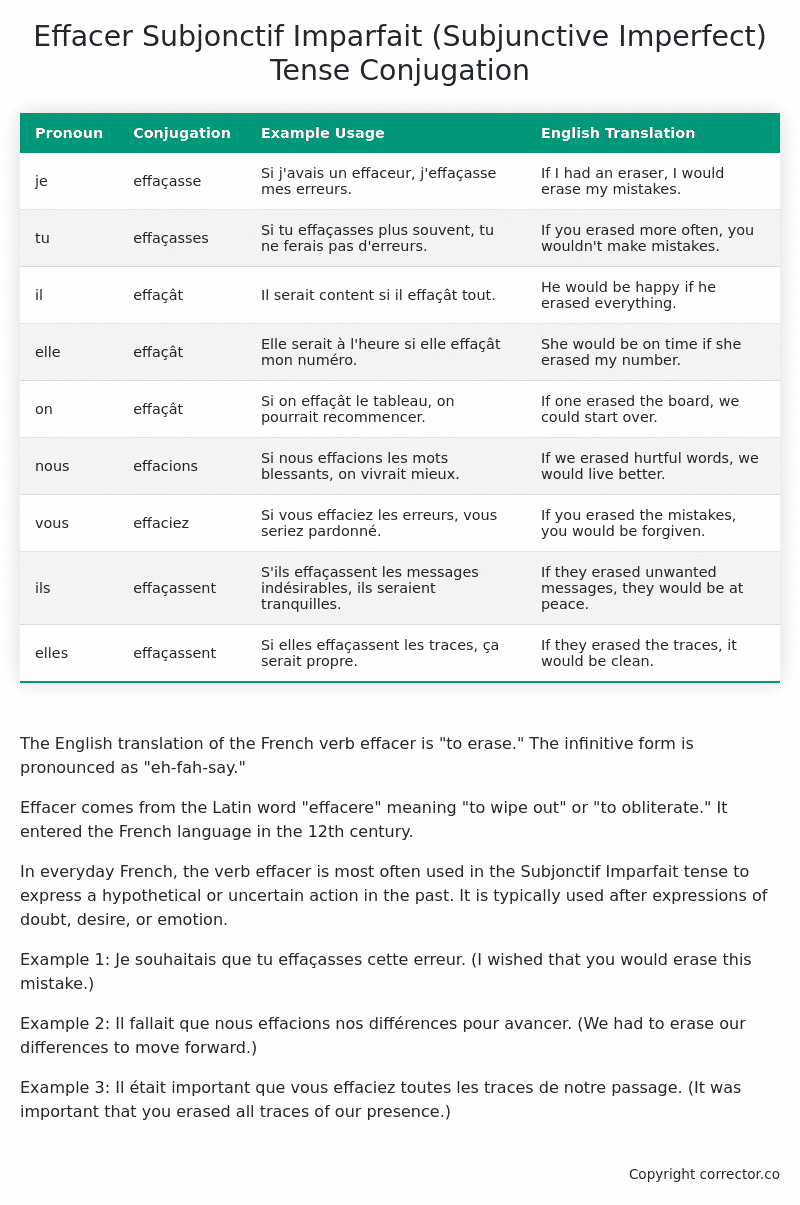Subjonctif Imparfait (Subjunctive Imperfect) Tense Conjugation of the French Verb effacer
Introduction to the verb effacer
The English translation of the French verb effacer is “to erase.” The infinitive form is pronounced as “eh-fah-say.”
Effacer comes from the Latin word “effacere” meaning “to wipe out” or “to obliterate.” It entered the French language in the 12th century.
In everyday French, the verb effacer is most often used in the Subjonctif Imparfait tense to express a hypothetical or uncertain action in the past. It is typically used after expressions of doubt, desire, or emotion.
Example 1:
Je souhaitais que tu effaçasses cette erreur.
(I wished that you would erase this mistake.)
Example 2:
Il fallait que nous effacions nos différences pour avancer.
(We had to erase our differences to move forward.)
Example 3:
Il était important que vous effaciez toutes les traces de notre passage.
(It was important that you erased all traces of our presence.)
Table of the Subjonctif Imparfait (Subjunctive Imperfect) Tense Conjugation of effacer
| Pronoun | Conjugation | Example Usage | English Translation |
|---|---|---|---|
| je | effaçasse | Si j’avais un effaceur, j’effaçasse mes erreurs. | If I had an eraser, I would erase my mistakes. |
| tu | effaçasses | Si tu effaçasses plus souvent, tu ne ferais pas d’erreurs. | If you erased more often, you wouldn’t make mistakes. |
| il | effaçât | Il serait content si il effaçât tout. | He would be happy if he erased everything. |
| elle | effaçât | Elle serait à l’heure si elle effaçât mon numéro. | She would be on time if she erased my number. |
| on | effaçât | Si on effaçât le tableau, on pourrait recommencer. | If one erased the board, we could start over. |
| nous | effacions | Si nous effacions les mots blessants, on vivrait mieux. | If we erased hurtful words, we would live better. |
| vous | effaciez | Si vous effaciez les erreurs, vous seriez pardonné. | If you erased the mistakes, you would be forgiven. |
| ils | effaçassent | S’ils effaçassent les messages indésirables, ils seraient tranquilles. | If they erased unwanted messages, they would be at peace. |
| elles | effaçassent | Si elles effaçassent les traces, ça serait propre. | If they erased the traces, it would be clean. |
Other Conjugations for Effacer.
Le Present (Present Tense) Conjugation of the French Verb effacer
Imparfait (Imperfect) Tense Conjugation of the French Verb effacer
Passé Simple (Simple Past) Tense Conjugation of the French Verb effacer
Passé Composé (Present Perfect) Tense Conjugation of the French Verb effacer
Futur Simple (Simple Future) Tense Conjugation of the French Verb effacer
Futur Proche (Near Future) Tense Conjugation of the French Verb effacer
Plus-que-parfait (Pluperfect) Tense Conjugation of the French Verb effacer
Passé Antérieur (Past Anterior) Tense Conjugation of the French Verb effacer
Futur Antérieur (Future Anterior) Tense Conjugation of the French Verb effacer
Subjonctif Présent (Subjunctive Present) Tense Conjugation of the French Verb effacer
Subjonctif Passé (Subjunctive Past) Tense Conjugation of the French Verb effacer
Subjonctif Imparfait (Subjunctive Imperfect) Tense Conjugation of the French Verb effacer (this article)
Subjonctif Plus-que-parfait (Subjunctive Pluperfect) Tense Conjugation of the French Verb effacer
Conditionnel Présent (Conditional Present) Tense Conjugation of the French Verb effacer
Conditionnel Passé (Conditional Past) Tense Conjugation of the French Verb effacer
L’impératif Présent (Imperative Present) Tense Conjugation of the French Verb effacer
L’infinitif Présent (Infinitive Present) Tense Conjugation of the French Verb effacer
Struggling with French verbs or the language in general? Why not use our free French Grammar Checker – no registration required!
Get a FREE Download Study Sheet of this Conjugation 🔥
Simply right click the image below, click “save image” and get your free reference for the effacer Subjonctif Imparfait tense conjugation!

Effacer – About the French Subjonctif Imparfait (Subjunctive Imperfect) Tense
Formation
Common Everyday Usage Patterns
Interactions with Other Tenses
Subjonctif Présent
Indicatif Passé Composé
Conditional
Conditional Perfect
Summary
I hope you enjoyed this article on the verb effacer. Still in a learning mood? Check out another TOTALLY random French verb conjugation!


